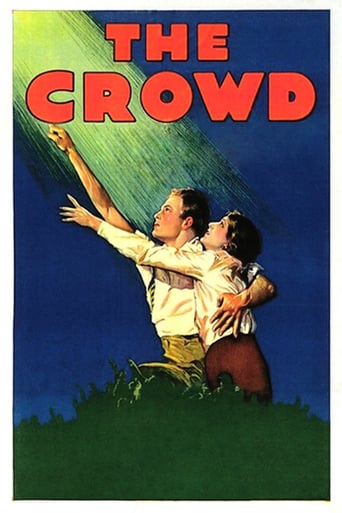Djayesse
John (James Murray) and Mary (Eleanor Boardman - Mrs Vidor) are two, faces in the crowd. They meet, they get married, they have children. A common story. But in the cinema, nothing is common.We are more interested in John. He is a good little boy full of promises. He will become someone important. Unless… Unless his father dies, which happens when he is 12. Now we switch the figures. John is 21. He lands in New York convinced he is different and will tame this city. Meanwhile, he works as an accountant in an insurance company. But he studies at night, to become – still – someone important. One evening, his friend Bert (Bert Roach) invites him to Coney Island with two girls. At first, he refuses but in the end, he accepts. There, he meets Mary. They kiss in the Tunnel of Love. They are soon to get married. Despite Bert's pessimism, their marriage lasts. They have two kids. One day, John has a brilliant idea for an advertisement. He gets 500 dollars. He calls his children to celebrate this great moment. This is when Fate intervenes: their little girl gets run over by a car. Misfortunes will multiply, and John will have to fight the Crowd of those who did not want to be different.This film by King Vidor is not what we call a joyful film. It is very different from what the MG was offering to the movie audiences. Showing normal people was not a very good marketing product. It was not well accepted to show ordinary people and a sad ending. Therefore, Vidor held on and this ending is one of the nine endings which were shot. This is the least sad ending (the least bad ending?): John does not reach his goal. He will never be someone important. Just a face in the crowd, among many (many, many…) others. This is why the film is very interesting. We can see a quick romance. Quick, because the whole society demands it. everything goes fast: cars, trains and people going to work. Therefore, people have very little time for themselves, or to build something. The crowd is a huge wave which overwhelms everything. The peak hours are a moment which show this very well. When the clock strikes the end of the day's work, you can see crowds of people rushing to the elevators or the undergrounds alone or as couples. But John just want one thing: being different. He feels superior to the others. He thinks he has a mission, a great purpose. And this feeling starts irritating the others. He even mocks the poor guys who have to juggle to make (a bit of) a living, advertising for a restaurant. But would he have mock them if he had known that one day, he would have to do the same thing? As soon as John enters New York, things are different. Vidor picks up a building, the camera travels from bottom to the top, stops in front of a window, and then enters: desks, desks, desks... Hundreds of them! So he goes on, forward, to one desk: John Sim, 137. And he takes this man - a face in this desk crowd - and brings him to the light. We are going to learn everything which makes him a man: his life, his dreams, his wife, his kids, his (step) family... And his misfortunes! (Vidor will recall the emotion of the little girl's death in another movie - Hallelujah - when another child dies) Even if this child brings him his misfortune, the other brings him anew hope: he is completely desperate, on the brink of suicide when he realizes that his other child LOVES him. His son wishes to become like him! This was what he needed. Now we know he will get better and better. But to get better, he will have to accept to be just a member of the society like anyone else, and therefore be just a face in the crowd. And he accepts it. The story is over. The camera goes backwards revealing us the crowd of people around him, again and again, till he disappears in this overwhelming crowd. Vidor has put him back where he originally belonged.
evanston_dad
I had wanted to see "The Crowd," King Vidor's silent classic about navigating the anonymity of big-city American life, forever, but couldn't ever find it. It finally aired again on TCM and I got a chance to see it for myself. What a marvelous film, a perfect example of a silent film director knowing how to use a purely visual medium for utmost impact.I've seen people debating the ending and whether it's happy or not. Apparently Vidor picked it out of six or so other options under pressure from the studio to end the film happily. But I think this was a case of a director subversively appearing to accommodate the demands of a studio while sticking to his guns. I personally did not feel like the ending of "The Crowd" was happy. Sure, we see the protagonist and his wife and surviving child laughing happily with others in a movie theater, but was I the only one who found the rows and rows of patrons, mechanically bobbing up and down like automatons, slightly disturbing?"The Crowd" received two Academy Award nominations in the institution's debut year: Unique and Artistic Picture and Best Director (Dramatic Picture). The first award went to "Sunrise" (can't argue with that) while the second went to Frank Borzage (which I can).Grade: A
jason-m-cook
The Crowd (King Vidor, 1928) I couldn't help but compare the marriage storyline in The Crowd to the one in Murnau's Sunrise, which I also recently watched. There is an impressive realistic approach taken to both. John and Mary in The Crowd run the full gamut from flirtation to tenderness to irritation to alienation, and back again. The first half hour is mostly lighthearted, but later takes some serious turns that are all the more affecting for having been preceded by the comedic touches of some of the early scenes. John shows a lot of arrogance without the ambition to back it up, which of course comes around to bite him eventually. I was not prepared for a certain tragic event, and it stunned me a little. Vidor does a great job depicting the anonymity that can often be found in the workplace, especially when you see rows upon rows of men in suits working at identical desks. Some have said that The Crowd has a downbeat ending, but I would have to disagree: to me it is just about the most positive ending that could follow from the events of the film. If you enjoy silent movies, you must see this wonderful comedy-drama from the days just before the talkie took over for good. 9/10
Hitchcoc
Most of us aren't winners and most of us aren't losers. "The Crowd" is the story of a man who has had his dreams taken from him by the fact that there are just so many of us, hence the title. He does his work each day. He parties. He loves. He hopes. And like with most of us, life throws him curves and he does what he can. Unfortunately, the death of a child is a big curve and it's hard to recover from that. I was really moved by this film. I generally find silent films curiosities. This one had the charm and the depth that any movie has. Yes, he seems like the kind of guy with the big ideas that we all know. The patience of his loving wife is more than he deserves. The portrayal of all this is marvelously done and pulls out a few tears. For anyone who wants one more chance, this is a nice movie. I understand that the lead is a man who succumbed to the misfortunes of life and paid a price that could have been like that of the protagonist. The cinematography is another thing that really works well in this film. King Vidor did incredible street shots showing the power of anonymity.




